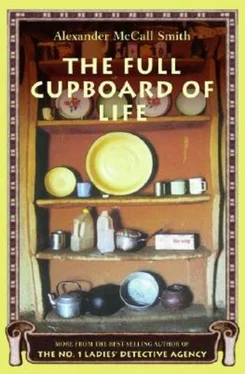Alexander Smith - The Full Cupboard of Life
Здесь есть возможность читать онлайн «Alexander Smith - The Full Cupboard of Life» весь текст электронной книги совершенно бесплатно (целиком полную версию без сокращений). В некоторых случаях можно слушать аудио, скачать через торрент в формате fb2 и присутствует краткое содержание. Жанр: Триллер, на английском языке. Описание произведения, (предисловие) а так же отзывы посетителей доступны на портале библиотеки ЛибКат.
- Название:The Full Cupboard of Life
- Автор:
- Жанр:
- Год:неизвестен
- ISBN:нет данных
- Рейтинг книги:4 / 5. Голосов: 1
-
Избранное:Добавить в избранное
- Отзывы:
-
Ваша оценка:
- 80
- 1
- 2
- 3
- 4
- 5
The Full Cupboard of Life: краткое содержание, описание и аннотация
Предлагаем к чтению аннотацию, описание, краткое содержание или предисловие (зависит от того, что написал сам автор книги «The Full Cupboard of Life»). Если вы не нашли необходимую информацию о книге — напишите в комментариях, мы постараемся отыскать её.
The Full Cupboard of Life — читать онлайн бесплатно полную книгу (весь текст) целиком
Ниже представлен текст книги, разбитый по страницам. Система сохранения места последней прочитанной страницы, позволяет с удобством читать онлайн бесплатно книгу «The Full Cupboard of Life», без необходимости каждый раз заново искать на чём Вы остановились. Поставьте закладку, и сможете в любой момент перейти на страницу, на которой закончили чтение.
Интервал:
Закладка:
Mma Ramotswe swallowed. “I understand very well,” she said. “I understand. Your heart is broken, Rra. I understand that.”
“It is broken inside me,” echoed Mr Bobologo. “You are right about that, Mma.”
There was not much else to be said, and they made their way down the path to Mma Ramotswe’s tiny white van, parked under a tree. But as they walked, Mma Ramotswe decided to ask another question, more by way of making conversation than to elicit information.
“What are your plans for the House of Hope, Rra?”
Mr Bobologo turned and looked back at the house. “We are going to build an extension there at the side,” he said. “We shall have new showers and a room where the girls can learn sewing. That is what we are going to do.”
“That will be expensive,” said Mma Ramotswe. “Extensions always seem to cost more than the house itself. These builders are greedy men.”
Mr Bobologo laughed. “But I will shortly be in a position to pay,” he said. “I think that I may be a rich man before too long.”
Had Mma Ramotswe been less experienced than she was, had she not been the founder of the No. 1 Ladies’ Detective Agency, this remark would have caused her to falter, to miss her step. But she was an experienced woman, whose job had shown her all of human life, and so she appeared quite unperturbed by what he had said. But these last few words that Mr Bobologo uttered-every one of them-fell into the pond of memory with a resounding splash.
CHAPTER FIFTEEN
THE FOLLOWING morning at Tlokweng Road Speedy Motors, when the morning rush had abated, Mma Ramotswe decided to stretch her legs. She had been sitting at her desk, dictating a letter to a client, while Mma Makutsi’s pencil moved over the page of her notepad with a satisfactory squeak. Shorthand had been one of her strongest subjects at the Botswana Secretarial College, and she enjoyed taking dictation.
“Many secretaries these days don’t have shorthand,” Mma Makutsi had remarked to Mma Ramotswe. “Can you believe it, Mma? They call themselves secretaries, and they don’t have shorthand. What would Mr Pitman think?”
“Who is this Mr Pitman?” asked Mma Ramotswe. “What is he thinking about?”
“He is a very famous man,” said Mma Makutsi. “He invented shorthand. He wrote books about it. He is one of the great heroes of the secretarial movement.”
“I see,” said Mma Ramotswe. “Perhaps they should put up a statue to him at the Botswana Secretarial College. In that way he would be remembered.”
“That is a very good idea,” said Mma Makutsi. “But I do not think they will do it. They would have to raise the money from the graduates, and I do not think that some of those girls-the ones who do not know anything about shorthand, and who only managed to get something like fifty per cent in the exams-I do not think they would pay.”
Mma Ramotswe nodded vaguely. She was not particularly interested in the affairs of the Botswana Secretarial College, although she always listened politely when Mma Makutsi sounded off about such matters. Most people had something in their lives that was particularly important to them, and she supposed that the Botswana Secretarial College was as good a cause as any. What was it in her own case, she wondered? Tea? Surely she had something more important than that; but what? She looked at Mma Makutsi, as if for inspiration, but none came, and she decided to return to the subject later, in an idle moment, when one had time for this sort of unsettling philosophical speculation.
Now, the morning’s dictation finished and the letters duly signed, Mma Ramotswe arose from her desk, leaving Mma Makutsi to address the envelopes and find the right postage stamps in the mail drawer. Mma Ramotswe glanced out of the window; it was precisely the sort of morning she appreciated-not too hot, and yet with an empty, open sky, flooded with sunlight. This was the sort of morning that birds liked, she thought; when they could stretch their wings and sing out; the sort of morning when you could fill your lungs with air and inhale nothing but the fragrance of acacia and the grass and the sweet, sweet smell of cattle.
She left the office by the back door and stood outside, her eyes closed, the sun on her face. It would be good to be back in Mochudi, she thought, to be sitting in front of somebody’s house peeling vegetables, or crocheting something perhaps. That’s what she had done when she was a girl, and had sat with her cousin, who was adept at crocheting and made place mat after place mat in fine white thread; so many place mats that every table in Botswana could have been covered twice over, but which somebody, somewhere, bought and sold on. These days she had no time for crocheting, and she wondered whether she would even remember how to do it. Of course, crocheting was like riding a bicycle, which people said that you never forgot how to do once you had learned it. But was that true? Surely there were things that one might forget how to do, if enough time elapsed between the occasions on which one had to do whatever it was that one had forgotten. Mma Ramotswe had once come across somebody who had forgotten his Setswana, and she had been astonished, and shocked. This person had gone to live in Mozambique as a young man and had spoken Tsonga there, and had learned Portuguese too. When he came back to Botswana, thirty years later, it seemed as if he were a foreigner, and she had seen him look puzzled when people used quite simple, everyday Setswana words. To lose your own language was like forgetting your mother, and as sad, in a way. We must not lose Setswana, she thought, even if we speak a great deal of English these days, because that would be like losing part of one’s soul.
Mma Makutsi, of course, had another language tucked away in her background. Her mother had been a speaker of Ikalanga, because she had come from Marapong, where they spoke a dialect of Ikalanga called Lilima. That made life very complicated, thought Mma Ramotswe, because that meant that she spoke a minor version of a minor language. Mma Makutsi had been brought up speaking both Setswana, her father’s language, and this strange version of Ikalanga, and then had learned English at school, because that was how one got on in life. You could never even get to the Botswana Secretarial College if you spoke no English, and you would certainly never get anywhere near ninety-seven per cent unless your English was almost faultless, like the English that schoolteachers used to speak.
Mma Ramotswe had more or less forgotten that Mma Makutsi spoke Ikalanga until one day she had used an Ikalanga word in the middle of a sentence, and it had stuck out.
“I have hurt my gumbo,” Mma Makutsi had said.
Mma Ramotswe had looked at her in surprise. “Your gumbo?”
“Yes,” said Mma Makutsi. “When I was walking to work today, I stepped into a pothole and hurt my gumbo.” She paused, noticing the look of puzzlement on Mma Ramotswe’s face. Then she realised. “I’m sorry,” she said. “ Gumbo is foot in Ikalanga. If you speak Ikalanga, your foot is your gumbo.”
“I see,” said Mma Ramotswe. “That is a very strange word. Gumbo.”
“It is not strange,” said Mma Makutsi, slightly defensively. “There are many different words for foot. It is foot in English. In Setswana it is lonao, and in Ikalanga it is gumbo, which is what it really is.”
Mma Ramotswe laughed. “There is no real word for foot. You cannot say it is really gumbo, because that is true only for Ikalanga-speaking feet. Each foot has its own name, depending on the language which the foot’s mother spoke. That is the way it works, Mma Makutsi.”
Читать дальшеИнтервал:
Закладка:
Похожие книги на «The Full Cupboard of Life»
Представляем Вашему вниманию похожие книги на «The Full Cupboard of Life» списком для выбора. Мы отобрали схожую по названию и смыслу литературу в надежде предоставить читателям больше вариантов отыскать новые, интересные, ещё непрочитанные произведения.
Обсуждение, отзывы о книге «The Full Cupboard of Life» и просто собственные мнения читателей. Оставьте ваши комментарии, напишите, что Вы думаете о произведении, его смысле или главных героях. Укажите что конкретно понравилось, а что нет, и почему Вы так считаете.












